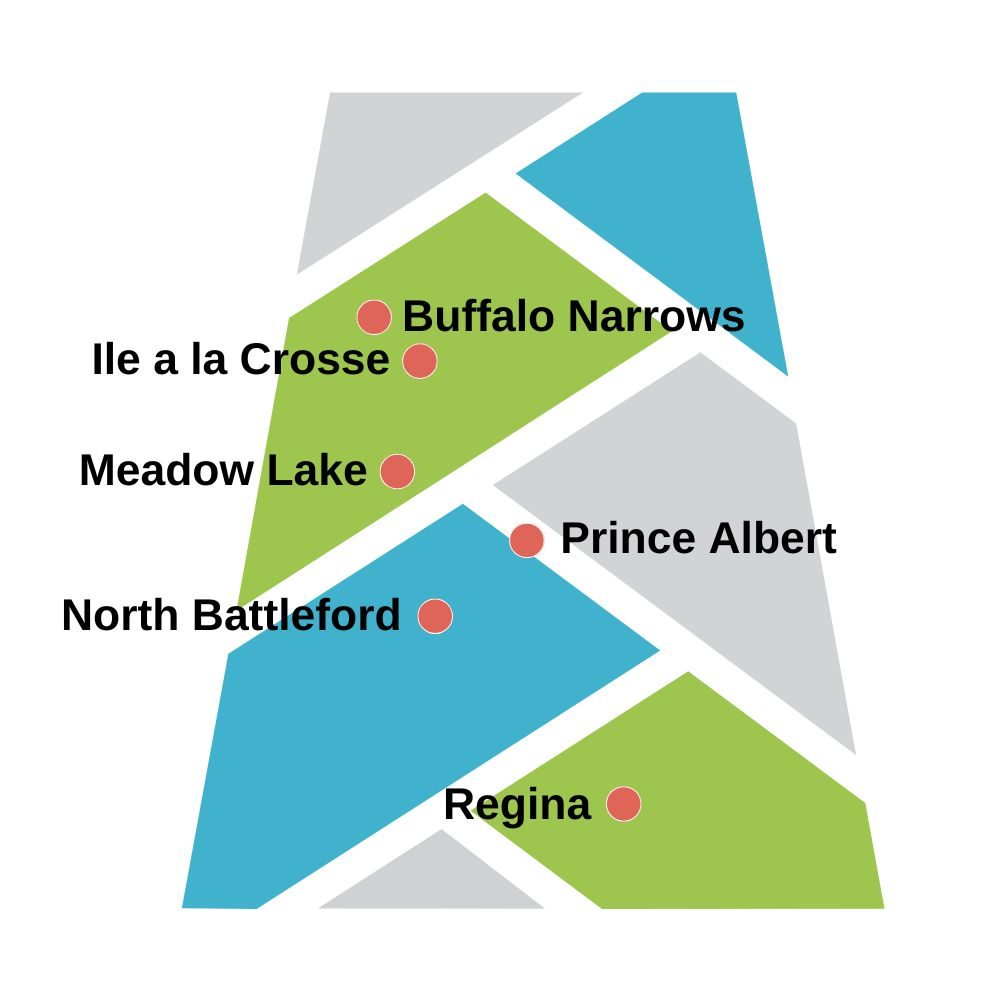The Aboriginal Friendship Centres of Saskatchewan (AFCS) continues to lead important work in mental health and wellness across the province. Through our Community-Led Mental Health Supports initiative, AFCS is empowering Friendship Centres to deliver culturally grounded, trauma-informed, and community-driven supports that meet people where they are.
Centering Culture, Community, and Connection
The initiative is rooted in four key pillars:
- Culturally Safe Approaches: Honouring Indigenous knowledge systems, traditions, and healing practices.
- Trauma-Informed Care: Recognizing the lasting impacts of historical and intergenerational trauma.
- Holistic Healing: Supporting mental, physical, emotional, and spiritual well-being together.
- Community-Led Programming: Enabling each Friendship Centre to tailor supports that reflect their community’s strengths and realities.
These pillars guide everything from expressive arts therapy and peer support circles to workshops on grief, addiction, parenting, and workplace mental health.
Friendship Centres: The First Point of Support
In most cases, community members feel more comfortable turning to a Friendship Centre first, rather than an institutionalized facility, for support and resources. Friendship Centres act as the first point of contact, providing a welcoming, culturally safe environment and guiding individuals along a pathway to further help when needed.
Responding to Urgent Mental Health Needs
Across Saskatchewan, Friendship Centres have identified mental health as one of the most pressing community needs. According to the State of Mental Health in Saskatchewan report:
- Saskatchewan’s rate of mood and anxiety disorders (15.5%) is higher than the national average (10.6%).
- Suicide rates remain well above national levels, with especially concerning trends among First Nations people.
- Only 48% of youth with early mental health needs have accessed services—well below the Canadian average of 61%.
Through the Community-Led Mental Health Supports initiative, more than 1,900 people have engaged in mental health programming at 6 Saskatchewan Friendship Centres, with numbers continuing to grow as the initiative expands.
Community-Based Healing in Action
Each participating Friendship Centre has developed programming grounded in its community’s needs and culture. Activities have included:
- Peer and Support Circles for women, men, youth, and 2S participants.
- Workshops and Presentations on grief and healing, mental health in the workplace, addictions awareness, and healthy relationships.
- Cultural Programming such as Moon Ceremonies, Sweat Lodges, and Expressive Arts Therapy.
- Community Events like Advocacy Walks, Pancake Breakfasts and Community Dinners that foster connection and belonging.
Participants have described the sessions as “safe,” “healing,” and “a place where I finally felt heard.” Staff have seen visible changes in behavior, increased engagement, and growing community trust.
Building Strong Partnerships
AFCS and Friendship Centres have strengthened partnerships with local organizations, schools, shelters, and service agencies. Creating wrap-around supports that include addictions recovery, family violence prevention, and youth engagement. Partnerships with Elders and Knowledge Keepers continue to ensure cultural integrity and guidance in every aspect of the work.
Lessons and Growth
Key learnings from this initiative include the power of creating emotionally safe spaces, integrating culture in every program, and meeting people where they are. The initiative also highlights the importance of addressing barriers such as transportation, childcare, and safe spaces for programming, especially in northern and urban centres.
A Vision for Sustainable Healing
AFCS’s mental health work has shown measurable success in improving community well-being and professional capacity among service providers. We remain committed to securing long-term, sustainable funding so that every Friendship Centre in Saskatchewan can offer accessible, culturally grounded mental health supports for generations to come.
“Our Friendship Centres are the heart of our communities,” says Janet Carriere, Past President and current Treasurer of AFCS. “When we strengthen mental health supports here, we create space for healing, belonging, and hope.”
As Saskatchewan continues to face complex mental health challenges, AFCS stands firm in its vision: a province where every person can heal in community, grounded in culture, and surrounded by care.

- Battleford Indian & Metis Friendship Centre
- Buffalo Narrows Friendship Centre
- Ile a la Crosse Friendship Centre
- Kikinahk Friendship Centre
- La Loche Friendship Centre
- Newo-Yotina Friendship Centre
- North West Friendship Centre
- Prince Albert Indian & Metis Friendship Centre
- Qu’Appelle Valley Friendship Centre
- Saskatoon Indian & Metis Friendship Centre